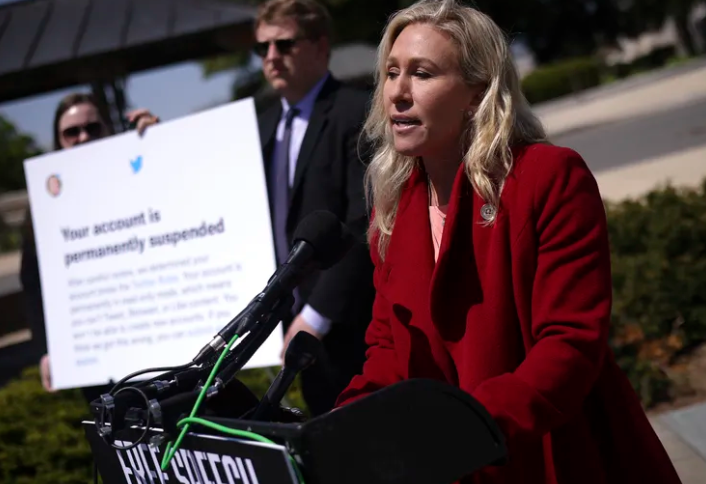Rep. Marjorie Taylor Green supports Section 230 repeal bill
Rep. Marjorie Taylor Green supports Section 230 repeal bill
Standing beside a poster-sized printout of her suspended Twitter account, Rep. Marjorie Taylor Green (R-GA) introduced a new bill Thursday to repeal Section 230 — the hotly debated law that exempts tech companies from liability. gives a discount. Saves what users post on their own. Forum.
Titled the Free Speech Act of the 21st Century, Greene's measure serves as a House companion to the Senate version of the bill introduced by Sen. Bill Haggerty (R-TN) last year. The bill would repeal Section 230 and replace it with language requiring "fair, non-discriminatory access to online communication platforms" by classifying it as a "common carrier".
Days after Green announced Elon Musk won a bid to take Twitter private at $54.20 a share, Musk sought to anger leftists and rightists alike in a new effort to make the platform "politically neutral." demanded. swore off. Earlier this year Green's personal Twitter account was permanently suspended for violating the platform's policies against COVID-19 misinformation. During Thursday's press conference, Green said he spent months analyzing several bills targeting Big Tech censorship. After Musk's Twitter bid was accepted this week, she rushed to find a bill to support, landing on Haggerty's measure.
"Elon Musk is buying Twitter and talking about protecting freedom of expression has accelerated efforts to block Democrats' speech from speech," Green said. "It made me realize, you know, that I need to introduce it now."
In an optimistic tweet on Monday, Green lauded Musk's acquisition, writing, "The blue check marks prepare for a full scale recession after [Musk] seals the deal and I must restore my personal Twitter account."
The task of classifying social media platforms as common carriers -- similar to telecommunications services like broadband -- was first set by Supreme Court Justice Clarence Thomas last April. When the court refused to take up the case against former President Donald Trump for blocking people on Twitter, Thomas issued a consensus opinion that presented the idea of using a classification that would limit net neutrality for broadband providers. defines. Uses rules.
Thomas wrote in the opinion, "There is a reasonable argument that some digital platforms equate to common carriers or places of residence being regulated in this manner." "In theory, the common car would ban forums from unfairly discriminating against speech."
Thomas' opinion had no legal force, but it provided a new alternative for Republicans angered by Big Tech censorship outside the usual tedious and delicate legislative process related to Section 230 reform.
Still, Haggerty's bill has not received much support from lawmakers outside Green. Asked how Republicans would win over Democratic support to approve the bill, Green said he expects it to go ahead if Republicans withdraw the House after this year's midterm election.







No comments